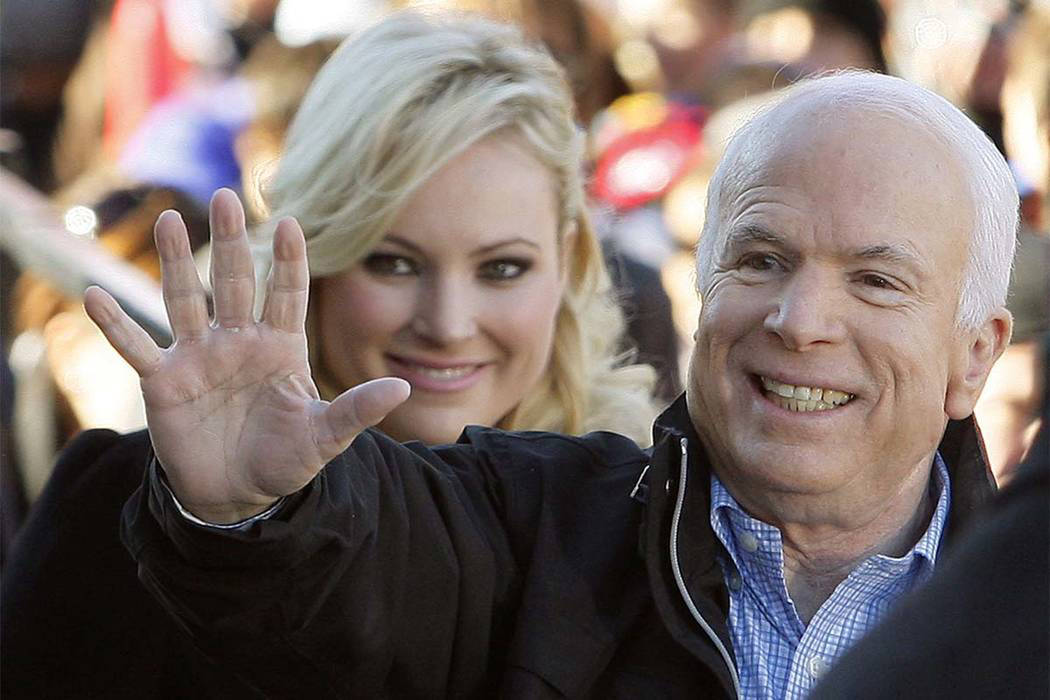McCain was darling of Democrats — until he ran for president

WASHINGTON — The Republican nominee for president didn’t have the “temperament” to be commander in chief, charged Nevada Sen. Harry Reid, adding that he “can’t stand” the guy. Moveon.org called him “reckless” and “dangerous.” Rep. John Lewis, D-Ga., warned that the GOP candidate was a modern day George Wallace and his rhetoric “is playing with fire.”
Donald Trump in 2016? No, John McCain, 2008.
Call it the McCain conundrum. Through much of the last two decades, McCain, who died a week ago, was the darling of Democrats and a beloved figure to political reporters, whom he jokingly referred to as his “base.”
When he had a bite at the Oval Office, however, those groups abandoned him, and treated him as they’ve treated so many other conservatives.
“When he was taking on George Bush or Donald Trump, he was every Democrat’s favorite Republican. When he was running against Barack Obama, not so much,” said Dan Schnur, a professor at Southern California’s Annenberg School of Communications, who was communications director for McCain’s 2000 campaign.
During the 2008 campaign, Sen. Chuck Schumer, D-N.Y., called the GOP nominee for president “an unappealing candidate” who has “done great things for our country, but he doesn’t particularly empathize with the plight of the average person.”
Ten years later, but mere hours after McCain’s death Saturday, Schumer announced on Twitter that he would introduce a resolution to rename the Russell Senate Office Building for McCain.
“His dedication to his country and the military were unsurpassed, and maybe most of all, he was a truth teller — never afraid to speak truth to power in an era where that has become all too rare,” Schumer said.
The Gallup poll has followed McCain’s popularity since 1999. Right after the 2008 election, which he lost to Democrat Obama, less than half of Democrats had a favorable view of the former POW. At the time, twice as many Republicans liked McCain than Democrats.
Over the years, Democrats warmed to McCain to the point that 49 percent had a favorable view of him in 2015. But his approval rating among Democrats soared in 2017, when it hit 71 percent. Gallup credits McCain’s vote against repealing the Affordable Care Act, but another likely factor was the Arizona senator’s constant sparring with Trump.
As GOP strategist Mark Corallo sees it, Democrats were downright mean to McCain in 2008. They said he was too old, unstable, didn’t have the temperament and they were worried he’d push the nuclear button.
“I hope he learned a valuable lesson that most Republicans learn early on. Democrats love Republicans who attack Republicans, just like the press love Republicans who attack Republicans – until that Republican is running for high office,” said Corallo. “Then they’re the devil incarnate.”
Republicans had a rocky road with McCain as well. Gallup found that more Democrats than Republicans had a favorable view of McCain in 2001 and 2002.
Fox News contributor Tomi Lahren called McCain a RINO – Republican in Name Only – on the day the McCain family announced he was stopping cancer treatment.
Henry Olsen of the Ethics and Public Policy Center argued that while McCain sided with Democrats on campaign finance and climate change, his voting record was highly conservative.
The American Conservative Union said that over his lifetime, McCain voted conservatively 81 percent of the time.
By comparison, ACU rated GOP Sens. Orrin Hatch of Utah at 88 percent, Sen. Chuck Grassley of Iowa 84 percent, Lisa Murkowski of Alaska 60 percent and Susan Collins of Maine 45 percent. Collins and Murkowski cast the two other Republican votes against repealing Obamacare.
“He’s not a moderate,” Schnur contended. “Most conservatives don’t get that upset about Susan Collins or Lisa Murkowski, but when he strayed from conservative orthodoxy, the way he did it left a mark.”
McCain certainly knew how to get under the skin of Trump White House aides. In May after McCain urged senators not to approve Gina Haspel to head the CIA because she authorized the use of enhanced interrogation techniques, a White House aide dismissed McCain’s opposition as inconsequential because “he’s dying anyway.”
The Senate went on to confirm Haspel, but staffer Kelly Sadler was out of her White House job in June.
In a show of bipartisanship, Schumer and House Minority Leader Nancy Pelosi joined Senate Majority Leader Mitch McConnell and Speaker Paul Ryan in presenting wreaths before McCain’s coffin as he lied in state in the Capitol rotunda Friday.
Vice President Mike Pence attended as a representative of the White House.
Senate Republicans remained lukewarm to Schumer’s call to rename the Senate building after the GOP maverick. McConnell suggested that the leadership organize a bipartisan “gang” of senators to decide among themselves a suitable landmark for McCain’s name.
No surprise, there, opined Olsen; Schumer is “using McCain as a cudgel,” he said.
“If Bob Dole dies tomorrow, Schumer’s not proposing naming the Hart (Senate Office) Building after him,” Olsen said of the former Republican senator from Kansas. Dole rose higher in the august body, first as Senate minority leader, then Senate majority leader. And like McCain, Dole is a war hero who was severely wounded in combat and never regained the full use of his arms.
The difference, as Olsen sees it, was that Dole, who endorsed Trump in 2016, did not hector Republicans as McCain at times did.
Sometimes, Corallo observed, McCain “seemed more comfortable attacking Republicans, and was so sure he was right.”
Contact Debra J. Saunders at dsaunders@reviewjournal.com or 202-662-7391. Follow @DebraJSaunders on Twitter.